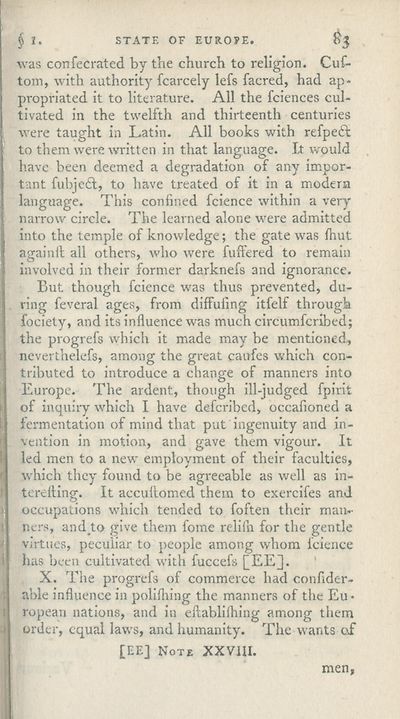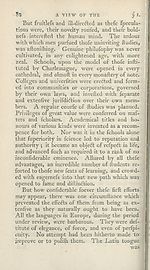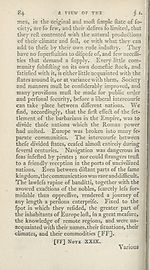Download files
Complete book:
Individual page:
Thumbnail gallery: Grid view | List view

I.
STATE OF EUROPE.
h
was confecrated by the church to religion. Cut-
torn, with authority fcarcely lets facred, had ap¬
propriated it to literature. All the fciences cul¬
tivated in the twelfth and thirteenth centuries
were taught in Latin. All books with refpebt
to them were written in that language. It would
have been deemed a degradation of any impor¬
tant fubjedt, to have treated of it in a modern
language. This confined fcience within a very'
narrow circle. The learned alone were admitted
into the temple of knowledge; the gate was fhut
againlf all others, who were fuffered to remain
involved in their former darknefs and ignorance.
But. though fcience was thus prevented, du¬
ring feveral ages, from diffufing itfelf through
fociety, and its influence was much circumfcribed;
the progrefs which it made may be mentioned,
neverthelefs, among the great caufes which con¬
tributed to introduce a change of manners into
Europe. The ardent, though ill-judged fpirit
of inquiry which I have defcribed, occafioned a
fermentation of mind that put ingenuity and in¬
vention in motion, and gave them vigour. It
led men to a new employment of their faculties,
which they found to be agreeable as well as in-
tereiling. It accullomed them to exercifes and
occupations which tended to foften their man¬
ners, and to give them fome relifh for the gentle
virtues, peculiar to people among whom Icience
has been cultivated with fuccefs [EE].
X. The progrefs of commerce had confider-
able influence in poliflting the manners of the Eu¬
ropean nations, and in eftablilhing among them
order, equal laws, and humanity. The wants of
[EE] Note XXVUI.
men,
STATE OF EUROPE.
h
was confecrated by the church to religion. Cut-
torn, with authority fcarcely lets facred, had ap¬
propriated it to literature. All the fciences cul¬
tivated in the twelfth and thirteenth centuries
were taught in Latin. All books with refpebt
to them were written in that language. It would
have been deemed a degradation of any impor¬
tant fubjedt, to have treated of it in a modern
language. This confined fcience within a very'
narrow circle. The learned alone were admitted
into the temple of knowledge; the gate was fhut
againlf all others, who were fuffered to remain
involved in their former darknefs and ignorance.
But. though fcience was thus prevented, du¬
ring feveral ages, from diffufing itfelf through
fociety, and its influence was much circumfcribed;
the progrefs which it made may be mentioned,
neverthelefs, among the great caufes which con¬
tributed to introduce a change of manners into
Europe. The ardent, though ill-judged fpirit
of inquiry which I have defcribed, occafioned a
fermentation of mind that put ingenuity and in¬
vention in motion, and gave them vigour. It
led men to a new employment of their faculties,
which they found to be agreeable as well as in-
tereiling. It accullomed them to exercifes and
occupations which tended to foften their man¬
ners, and to give them fome relifh for the gentle
virtues, peculiar to people among whom Icience
has been cultivated with fuccefs [EE].
X. The progrefs of commerce had confider-
able influence in poliflting the manners of the Eu¬
ropean nations, and in eftablilhing among them
order, equal laws, and humanity. The wants of
[EE] Note XXVUI.
men,
Set display mode to:
![]() Universal Viewer |
Universal Viewer | ![]() Mirador |
Large image | Transcription
Mirador |
Large image | Transcription
| Antiquarian books of Scotland > Kings & rulers > History of the reign of the Emperor Charles V. > Volume 1 > (101) |
|---|
| Permanent URL | https://digital.nls.uk/109183543 |
|---|
| Description | By William Robertson. London : Cadell and Davies, 1798. |
|---|---|
| Shelfmark | ABS.1.76.13 |
| Additional NLS resources: | |
| Description | Thousands of printed books from the Antiquarian Books of Scotland collection which dates from 1641 to the 1980s. The collection consists of 14,800 books which were published in Scotland or have a Scottish connection, e.g. through the author, printer or owner. Subjects covered include sport, education, diseases, adventure, occupations, Jacobites, politics and religion. Among the 29 languages represented are English, Gaelic, Italian, French, Russian and Swedish. |
|---|

